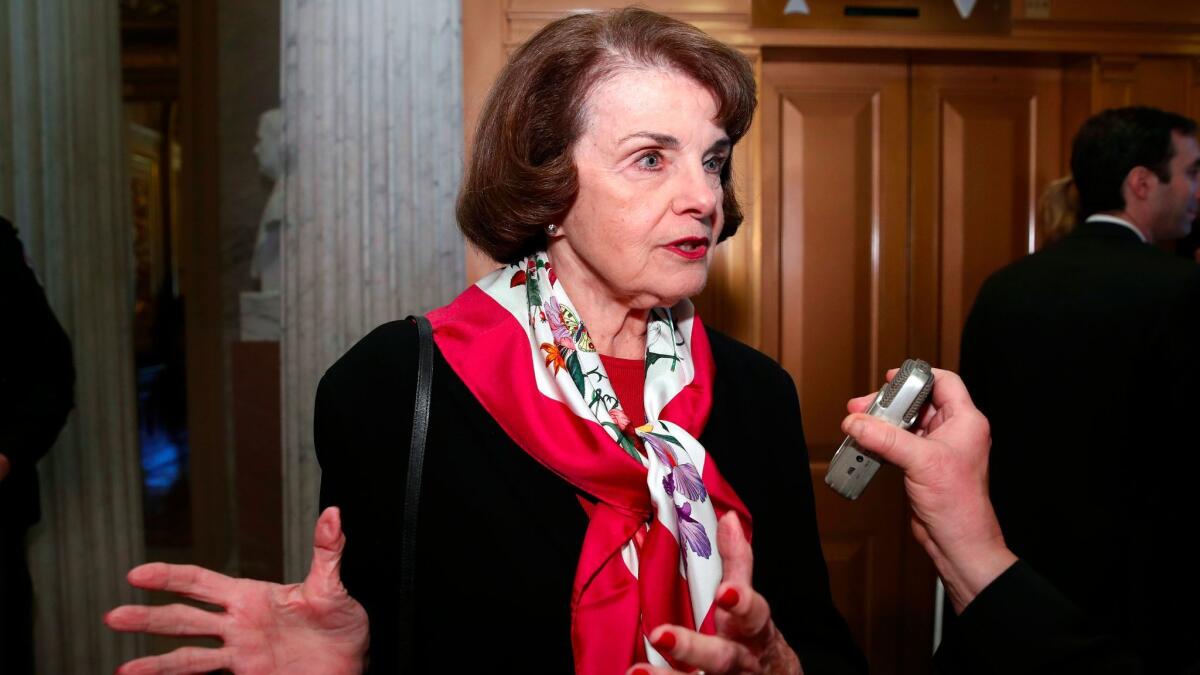Feinstein won’t seek top Judiciary Committee spot following complaints from progressives

WASHINGTON — Sen. Dianne Feinstein said Monday she will not pursue leadership of the high-profile Senate Judiciary Committee or any other committee next year, taking a dramatic step back following pressure from progressives who questioned her willingness to use tough, partisan politics to confirm Biden administration Supreme Court picks and other judicial nominations.
“California is a huge state confronting two existential threats — wildfire and drought — that are only getting worse with climate change. In the next Congress, I plan to increase my attention on those two crucial issues,” Feinstein said in a statement. “I also believe that defeating COVID-19, combating climate change and protecting access to healthcare are critical national priorities that require even more concentration.”
Feinstein, 87, is currently the ranking Democrat on the Judiciary Committee and was in line to become its first female chairman if Democrats take control of the Senate.
But the majority won’t be decided until two Senate seats in Georgia go to a runoff in January. Democrats will need to win both of those races to gain control of the Senate and with it, the power to confirm Biden’s judicial appointments.
Feinstein’s decision to give up such a highly coveted post is likely to renew speculation — which arose in 2018 when at age 85 she ran for a sixth term — that she will not serve the entirety of her Senate term.
Her decision not to pursue any full committee posts — including the Senate Intelligence Committee, where she also has the seniority to lead — comes as her tenure on the Judiciary Committee has come under fire, particularly her handling as the ranking Democrat of the confirmation hearings of President Trump’s Supreme Court nominees Brett M. Kavanaugh and Amy Coney Barrett.
Some rank-and-file Democrats had quietly discussed with Senate Minority Leader Charles E. Schumer (D-N.Y.) whether seniority is still the best way for Democrats to determine chairmanships and whether Feinstein was the right person to lead Democrats on the Judiciary Committee. Schumer met with Feinstein in late October for what he described as a “very serious” conversation.
Senior lawmakers rarely step down from powerful chairmanship or ranking-member positions, making Feinstein’s decision unusual. While Republicans have term limits for committee chairmanships, Democrats do not.
Feinstein, once one of the Democratic Party’s most seasoned and effective legislators, authored the nation’s first federal assault weapons ban, which expired in 2004, and as head of the Senate Intelligence Committee in 2014, fought the Obama-era CIA and Republicans to release unclassified portions of a massive government probe into U.S. use of torture.
But at a time of ever-growing partisanship in Washington, some fellow Democrats complained she was not tough enough on Republicans during the Barrett hearing, after which Feinstein shared a hug with Senate Judiciary Committee Chairman Lindsey Graham (R-S.C.).
“This has been one of the best set of hearings that I’ve participated in,” Feinstein said to Graham. “It leaves one with a lot of hopes, a lot of questions and even some ideas perhaps of good bipartisan legislation we can put together.”
Her comment not only undercut Democrats’ message that Barrett’s confirmation was illegitimate because it came so close to the election, it also helped boost Graham, who was engaged in what was thought to be a neck-and-neck battle for reelection with Democrat Jaime Harrison in South Carolina.
During the ugly fight over Kavanaugh, Feinstein was criticized for agreeing to Christine Blasey Ford’s request for anonymity after the Palo Alto professor privately alleged that Kavanaugh assaulted her when they were teenagers, a charge he denied. Ford eventually came forward to testify voluntarily.
Progressive groups such as Demand Justice and NARAL Pro-Choice America openly called for Feinstein to step down from her leadership of Democrats on the Judiciary Committee following the Barrett hearing.
After the election, more than a dozen progressive groups, including Demand Justice, MoveOn and the Sunrise Movement, privately pleaded with Schumer to step in and replace Feinstein.
“Our current national moment requires leaders who recognize the many threats to our democracy and who act boldly and unapologetically to address those threats. Sen. Feinstein, unfortunately, is not one of those leaders,” they wrote. “We therefore urge you to replace her in her leadership role on the Senate Judiciary Committee with a Democratic senator who will be.”
Demand Justice Executive Director Brian Fallon said Feinstein’s decision to step down was “necessary” if Democrats want to push back on Trump and Senate Majority Leader Mitch McConnell’s (R-Ky.) conservative imprint on the courts. The committee now “must be led by someone who will not wishfully cling to a bygone era of civility and decorum that Republicans abandoned long ago,” and someone who is willing to fight “no matter what.”
It is unclear who will succeed Feinstein. Sen. Patrick Leahy (D-Vt.) is next in line in seniority, but he is viewed as unlikely to give up his post on the Appropriations Committee. Next up would be Sen. Richard J. Durbin (D-Ill.), who said Monday he will pursue the job. There is some question as to whether Democrats would want him to hold the Judiciary slot along with his position as the Democratic whip, but there is precedent for the whip to hold two slots. Sen. Sheldon Whitehouse (D-R.I.) could throw his hat in the ring as well.
Since she was first elected to Congress in 1992, Feinstein’s politics have generally trended closer to the middle than those of younger leaders in her party. That chasm has grown more defined as the party has moved further left.
For instance, she has been a proponent of keeping the legislative filibuster, which sets a de facto requirement of 60 votes in the Senate to approve legislation. Many other Democrats say it should be abandoned if they take control of the Senate in order to advance laws on climate change, voting rights and other measures expected to face solid GOP opposition. However, any discussion of eliminating the filibuster next year is moot as Democrats may not even have control of the chamber.
In recent months, Feinstein’s staff has sometimes had to clarify statements the senator has made in interviews in the Capitol. For instance, she told a Los Angeles Times reporter in September that she was unfamiliar with GOP moves to confirm appellate judges who don’t have the approval of their home-state senators, even though she had previously objected to that practice concerning judges in California.
Feinstein said she will maintain her roles as members of Judiciary, Intelligence and other key committees. In a statement, Schumer praised her prior work and gave a nod to the role she could play in the future.
“Sen. Feinstein’s experience, decades-long relationship with President-elect Biden, and leadership on so many issues will continue to be an asset for our caucus, California, and the country as we begin a new term with the new president,” he said.
More to Read
Get the L.A. Times Politics newsletter
Deeply reported insights into legislation, politics and policy from Sacramento, Washington and beyond. In your inbox three times per week.
You may occasionally receive promotional content from the Los Angeles Times.











